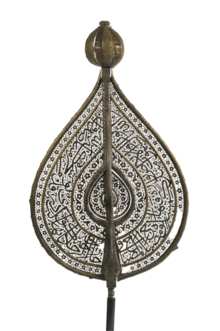Light vers
The verse of light ( Arabic آية النور Ayat-Nur ) is a line (35) from the 24 . Sura of the Koran , after which the whole sura is named. Like most of the sura, the verse is dated to the year 626.
text
Arabic original version:
« ٱلله نور ٱلسموت وٱلأرض مثل نوره كمشكوة فيہا مصباح ٱلمصباح فى زجاجة ٱلزجاجة كأنہا كوكب درى يوقد من شجرة مبركة زيتونة لا شرقية ولا غربية يكاد زيتہا يضىء ولو لم تمسسه نار نور على نور يہدى ٱلله لنوره من يشآء ويضرب ٱلله ٱلأمثل للناس وٱلله بكل شىء عليم »
Translation by Adel Theodor Khoury :
“God is the light of heaven and earth. Its light is comparable to a niche in which there is a lamp. The lamp is in a glass. The glass is like a twinkling star. It is lit by a blessed tree, an olive tree, neither east nor west, the oil of which is almost glowing, even without the fire having touched it. Light over light. God leads whom He wills to his light, and God leads the parables to man. And God knows all things. "
Transfer from Friedrich Rückert :
"God is the light of heaven and earth,
the parable of his light is
like a niche in which a lamp,
the lamp is in a glass,
the glass is like a sparkling star,
which is lit from the blessing tree,
not the oil tree from the east or from the west;
The oil almost itself shines,
even if it does not touch the flame;
Light over light - God guides
to his light, whom he wills: But
God shapes the parables on people,
and God is aware of every thing. "
meaning

The verse of light works especially as an inspiration for Sufism , Islamic mysticism.
It is a parable (مثال miṯāl ), the comparison between the light of God and the light of a lamp in a niche.
In some cases, an allusion to Christian worship in churches and monasteries and the lighted altar is assumed.
The light of God means his guidance (according to Ibn-ʽAbbās ), the order he has created in heaven and on earth (so al-Baṣrī ) or his care.
The word for "niche" (مشكاة miškā (t) ) is said to be a borrowing from Ethiopian (cf. amharic መስኮት , maskot 'window').
The olive tree, which is “neither east nor west”, is understood as the tree of paradise (so al-Baṣrī ) or as a tree on a hill that is illuminated with sunlight not only from the east or west, but from all sides ( so Ibn-ʽAbbās ).
The philosophical treatise The Niche of Lights ( Miškāt al-anwār ) comes from al-Ġazzālī .
The verse of light adorns numerous mosques as calligraphy , for example the Suleymaniye Mosque and the Nuruosmaniye Mosque in Istanbul .
See also
- Al-Fātiha (Sura 1)
- Throne verse (sura 2, verse 255)
- Aṣ-Ṣamadīya (sura 112)
literature
- Ayṣe Baṣol-Gürdal: Allah is the light of heaven and earth. The verse of light in Sura 24 an-Nur 35. Its meaning in the context of revelation and the main features of its interpretation in Islamic scholarship . Klaus Schwarz, Berlin 2008, ISBN 978-3-87997-357-6 .
Individual evidence
- ↑ A. Th. Khoury, Der Koran , Vol. 10, p. 25.
- ↑ On the whole also http://teacher.schule.at/islam/daten/der_koran/sure_24_vers_35.pdf ( page no longer available , search in web archives ) Info: The link was automatically marked as defective. Please check the link according to the instructions and then remove this notice. .
- ↑ See R. Paret, Der Koran: Commentary and Concordance , p. 360.
- ↑ A. Th. Khoury, Der Koran , Vol. 10, p. 71.
- ↑ R. Paret, The Koran: Commentary and Concordance , p. 360.
- ↑ A. Th. Khoury, Der Koran , Vol. 10, P. 71 f.